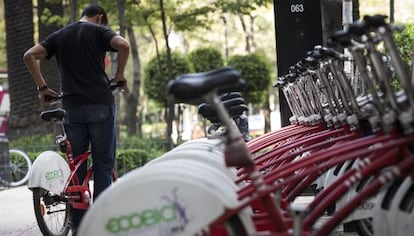Why Latin America’s biggest bike rental service is about to get bigger
More residents in the Mexican capital are turning to bicycles to avoid the congested traffic

It is not easy getting around Mexico City, but then again that observation is nothing new.
With 21 million residents, people in the capital must grapple with hills, torrential rains that destroy sidewalks and streets, and potholes that pose a danger to pedestrians.
About 83% of the vehicles on the streets belong to private owners, creating snarls that slow traffic down to an average 17 kilometers per hour in the congested urban areas, according to the city environmental office.
With more than 6,000 bikes, Ecobici has become the biggest public bicycle rental service in Latin America
So it is not surprising that more Mexico City residents are relying on bicycles to get around.
With more than 6,000 bikes, Ecobici has become the biggest public bicycle rental service in Latin America. Since it began operating in 2013, it has grown by 300%.
It is estimated that for every 1,000 residents, 187 trips are made on bicycle – a slightly higher ratio than in Montreal, Canada, where 114 trips are made for every 1,000.
Less than two years ago, 28-year-old Pablo Ganem decided to leave his car at home and ride a bike to work. He lives in Mexico City’s Condesa district and rides every day to the Roma sector, which is also located in the center of the city. Both are affluent neighborhoods which have been adapted for bike lanes and where a majority of young people live.
Tanya Müller, Mexico City’s environmental chief, said Ecobici will continue to expand by investing more money in infrastructure.
“This year and in the upcoming year we are going to concentrate on investing in more bike lanes and parking areas for those who own their own bikes. Those who need to ride to reach the subway will be able to leave their bikes there with the assurance that they will still be there when they return,” she said.
The city’s government has also embarked on a campaign to encourage people to ride bikes. Each Sunday, 55 kilometers of streets are closed off to car traffic and given over to cyclists, skate-boarders and joggers. Around 55,000 people show up for the weekly recreational event.
Nevertheless, for this alternative public transportation system to succeed, streets need to be refurbished and more public awareness campaigns are required.
Education campaigns for motorists pose the biggest challenge for Mexico City officials
Obtaining an Ecobici membership card costs 400 pesos (less than $7) a year and clients must fill out a brief questionnaire concerning the basic rules of cycling. The agency also offers training classes where cyclists can brush up on basic rules and learn about their rights on the road.
Müller said that this past summer around 22,000 people attended the five-session course.
Still, problems remain about educating motorists who are not accustomed to sharing the road with cyclists, as there are no mandatory classes for drivers.
“Road safety education is a long and continuing process,” explained Müller. “Many advances have been made in the capital but we cannot forget that half of the responsibility remains with the government while the other half is placed on citizens who should know the rules.”
Ganem said he believes that many more motorists are now cautious about cyclists and attributes the change to the many more bicycles on the city’s streets.
“I think the cycle service is very good. Yes, there is room for improvement; there are many treacherous streets and the telephone application isn’t the best, but in general it works fairly well,” he said.
English version by Martin Delfín.
Tu suscripción se está usando en otro dispositivo
¿Quieres añadir otro usuario a tu suscripción?
Si continúas leyendo en este dispositivo, no se podrá leer en el otro.
FlechaTu suscripción se está usando en otro dispositivo y solo puedes acceder a EL PAÍS desde un dispositivo a la vez.
Si quieres compartir tu cuenta, cambia tu suscripción a la modalidad Premium, así podrás añadir otro usuario. Cada uno accederá con su propia cuenta de email, lo que os permitirá personalizar vuestra experiencia en EL PAÍS.
¿Tienes una suscripción de empresa? Accede aquí para contratar más cuentas.
En el caso de no saber quién está usando tu cuenta, te recomendamos cambiar tu contraseña aquí.
Si decides continuar compartiendo tu cuenta, este mensaje se mostrará en tu dispositivo y en el de la otra persona que está usando tu cuenta de forma indefinida, afectando a tu experiencia de lectura. Puedes consultar aquí los términos y condiciones de la suscripción digital.








































